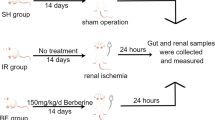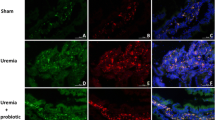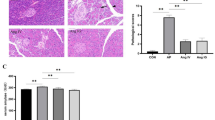Abstract
After renal ischemic reperfusion injury, a series of pathological changes, such as impaired intestinal barrier function, intestinal flora, and endotoxin translocation, are caused by intestinal ischemia and hypoxia, which then trigger systemic inflammatory responses and affect the condition and prognosis of the patients. In this study, a rat model of ischemia-reperfusion injury was established by examining changes in renal function, intestinal barrier function, inflammatory index, oxidative stress, and macrophage phenotypes to evaluate the effect of probiotic VSL#3 on renal ischemia-reperfusion injury. The results showed that, after VSL#3 intervention, the levels of BUN, Scr, Cys C, PRO, and NGAL were all significantly decreased compared with the I/R group, while the value of Ccr showed a significant increase. In addition, the concentrations of MPO, IL-1β, TNF-α, IL-6, ED-1, and PCNA were all significantly lower than those in the I/R group, while the levels of endotoxin, DOA, and d-lactic acid were significantly decreased. Furthermore, the proteins associated with intestinal barrier functions, such as ZO-1, Occludin, and Claudin-1, were significantly upregulated compared with the I/R group. Overall, the VSL#3 intervention group was able to maintain the required number of beneficial intestinal flora and to inhibit the proliferation of harmful bacteria. At the same time, the VSL#3 intervention could also prevent the decrease in the levels of CAT, GSH-PX, H2O2, and T-SOD, while downregulating the expression of Keap1 and Nrf2. After the intervention with the VSL#3, the expression levels of CD68 and CD86 proteins were significantly decreased, while the expression levels of CD163 and CD206 proteins were significantly higher. Further experiments confirmed that the expression of iNOS protein was significantly decreased after the VSL#3 intervention, and the expression of Arg-1 and Ym1 proteins was significantly increased. The VSL#3 was able to induce high expressions of p-GSK-3β and p-PTEN proteins, while the use of IL-10 antibody impaired the effect of the VSL#3. In summary, this research confirms that probiotics can alleviate renal dysfunction caused by ischemia and reperfusion by protecting the intestinal barrier function and maintaining the functions of intestinal flora. The pathway screening test of this study suggests that IL-10/GSK3β/PTEN may play an important role in the process of the prototypic VSL#3 inducing M2 transformation of macrophages.






Similar content being viewed by others
References
Allison SJ (2015) Acute kidney injury: activated protein c protective in iri. Nat Rev Nephrol 11(8):445
Aguilar A (2016) Acute kidney injury: loss of pkc-ɛ protects against iri. Nat Rev Nephrol 12(12):714
Binek M, Kizerwetter-Swida M, Cisek AA, Rzewuska M, Chrobak-Chmiel D, Gierynska M (2016) Mechanisms of maintenance of intestinal homeostasis by autochthonic microbiota and probiotics. Medycyna Weterynaryjna 72(10):611–615
Bron PA, Kleerebezem M, Brummer RJ, Cani PD, Mercenier A, Macdonald TT et al (2017) Can probiotics modulate human disease by impacting intestinal barrier function? Br J Nutr 117(1):93–107
Carney EF (2016) Acute kidney injury: role of platelet activation and nets in renal IRI. Nat Rev Nephrol 12(12):715
Chen K, Xie W, Luo B, Xiao W, Teitelbaum DH, Yang H et al (2016) Intestinal mucosal barrier is injured by bmp2/4 via activation of nf-b signals after ischemic reperfusion. Mediat Inflamm 2014(3):901530
Dai H, Wang M, Patel PN, Kalogeris TJ, Liu Y, Durante W et al (2017) Preconditioning with the bkca channel activator ns-1619 prevents ischemia/reperfusion-induced inflammation and mucosal barrier dysfunction: ros and ho-1. Am J Physiol Heart Circ Physiol 313(5):ajpheart.00620.2016
Ferenbach DA (2010). Role of the macrophage in acute kidney injury. University of Edinburgh, [Thesis]
Fan LH, Ting-Liang FU, Han XL (2017) The function and influence to intestinal barrier in ischemia-reperfusion injury. China Modern Medicine 8(11):348–351
Fan J, Xin J, Shao W (2017) Effects of probiotics combined with olsalazine sodium on intestinal mucosal barrier function and rage,srage in patients with ulcerative colitis. Journal of Guangxi Medical University 14(8):264–267
Han B, Sheng B, Zhang Z, Pu A, Yin J, Yang H (2016) Effect of aryl hydrocarbon receptor activation on intestinal mucosal barrier in mice after acute intestinal ischemia reperfusion injury. J Third Mil Med Univ 22(17):458–462
Jang HD, Noh JY, Shin JH, Lin JJ, Lee SY (2013) Pten regulation by the akt/gsk-3β axis during rankl signaling. Bone 55(1):126–131
Lech M, Gröbmayr R, Mi R, Lorenz G, Hartter I, Mulay SR et al (2014) Macrophage phenotype controls long-term Aki outcomes—kidney regeneration versus atrophy. J Am Soc Nephrol 25(2):292–304
Li X, Pu Y, Qiu Y, Wang W, Yang H, Xiao W (2017) Effect of adenosine 2a receptor on intestinal barrier function in mice with acute reperfusion injury. J Third Mil Med Univ 27(9):382–385
Luo B, Chen K, Feng Q, Xiao W, Ma D, Yang H et al (2018) The interplay of bmp4 and il-7 regulates the apoptosis of intestinal intraepithelial lymphocytes under conditions of ischemia̸reperfusion. Int J Mol Med 41(5):348–352
Meng XM, Tang PMK, Li J, Lan HY (2015) Macrophage phenotype in kidney injury and repair. Kidney Dis 1(2):138–146
Nakamura K, Zhang M, Kageyama S, Ke B, Sosa R, Reed E et al (2017) Myeloid HO-1 regulates M2 macrophage activation in liver ischemia-reperfusion injury (IRI). American Transplant Congress 17:550–550
Pang M, Qingping LU, Zhu L, Xia B, Zhang H (2016) Effects of probiotics to against acute diarrhea and on intestinal mucosal barrier of rats. Chin J Animal Nutr 12(6):274–277
Ren K, Chao J, Ma P, Ren Q, Jia Z, Zhu D (2016) Ginsenoside rd alleviates mouse acute renal ischemia/reperfusion injury by modulating macrophage phenotype. J Ginseng Res 40(2):196–202
Rosero O, Molnár D, Harsányi L, Szijártó A, Onody P, Kovács T et al (2014) Impaired intestinal mucosal barrier upon ischemia-reperfusion: “patching holes in the shield with a simple surgical method”. Biomed Res Int 2014(6):210901
Shu X, Zhang J, Wang Q, Xu Z, Yu T (2016) Glutamine decreases intestinal mucosal injury in a rat model of intestinal ischemia-reperfusion by downregulating hmgb1 and inflammatory cytokine expression. Exp Ther Med 12(3):1367–1372
Singh AP, Singh N, Singh Bedi PM (2016) Estrogen attenuates renal IRI through PPAR-γ agonism in rats. J Surg Res 203(2):324–330
Suguru Y, Jiayong Z, Yancey PG, Yiqin Z, Linton MRF, Sergio F et al (2015) Atherosclerosis following renal injury is ameliorated by pioglitazone and losartan via macrophage phenotype. Atherosclerosis 242(1):56–64
Sun M, Zhang Z, Han X, Zhang X & Anesthesiology DO (2017) Breviscapine pretreatment attenuates ischemia reperfusion induced intestinal mucosal barrier damage via promoting enos/no production. J Pract Med
Thorenz A, Schröder C, Dressler L, Skwirblies F, Chen R, Hüper K et al (2017) Mp236c5ar2 defficiency attenuates renal iri via il-10 dependent mechanisms. Nephrol Dial Transplant 32(suppl_3):512
Tian S, Zhang L, Tang J, Guo X, Dong K, Chen SY (2015) Hmgb1 exacerbates renal tubulointerstitial fibrosis through facilitating m1 macrophage phenotype at the early stage of obstructive injury. Am J Physiol Ren Physiol 308(1):69–75
Tian N-q, Su Y-t, Wang X-z, General Medicine Department, Baoji Central Hospital, & Cardiology Department et al (2018) Clinical effect of probiotics combined with glutamine in the treatment of liver cirrhosis and its effect on intestinal mucosal barrier and liver function. Clinical Research and Practice
Yang W, Nam KS, Ji-hyun J, Lee K-m, Sunhwa O, Shin I (2014) S100a4 negatively regulates β-catenin by inducing the egr-1-pten-akt-gsk3β degradation pathway. Cell Signal 26(10):2096–2106
Zhang Y, Zhang J, Nephropathy DO (2015) Mycophenolate mofetil affects toll-like receptor 4 signaling pathway of monocytes in renal ischemia/reperfusion injury(iri) of mice. Chinese Journal of Clinicians 17(13):363–366
Zhang Y, Zhang J, Nephropathy DO (2015) Mycophenolate mofetil affects toll-like receptor 4 signaling pathway of monocytes in renal ischemia/reperfusion injury (IRI) of mice. Chinese Journal of Clinicians (electronic version) 17(13):363–366
Zhou J, Ping FF, Lv WT, Feng JY, Shang J (2014) Interleukin-18 directly protects cortical neurons by activating pi3k/akt/nf-κb/creb pathways. Cytokine 69(1):29–38
Zhou J, Ping FF, Lv WT, Feng JY, Shang J (2014) Interleukin-18 directly protects cortical neurons by activating pi3k/akt/nf-κb/creb pathways. Cytokine 69(1):29–38
Funding
This work was supported by the scientific and technological project of Shaanxi Province (No. 2016SF-246); the National Nature Science Foundation of China (No. 81670681); and the Major clinical research projects of the First Affiliated Hospital of Xi’an Jiao Tong University (XJTU1AF-CRF-2015-005).
Author information
Authors and Affiliations
Corresponding authors
Ethics declarations
Conflict of interest
The authors declare that they have no conflict of interest.
Rights and permissions
About this article
Cite this article
Ding, C., Han, F., Xiang, H. et al. Probiotics ameliorate renal ischemia-reperfusion injury by modulating the phenotype of macrophages through the IL-10/GSK-3β/PTEN signaling pathway. Pflugers Arch - Eur J Physiol 471, 573–581 (2019). https://doi.org/10.1007/s00424-018-2213-1
Received:
Revised:
Accepted:
Published:
Issue Date:
DOI: https://doi.org/10.1007/s00424-018-2213-1




